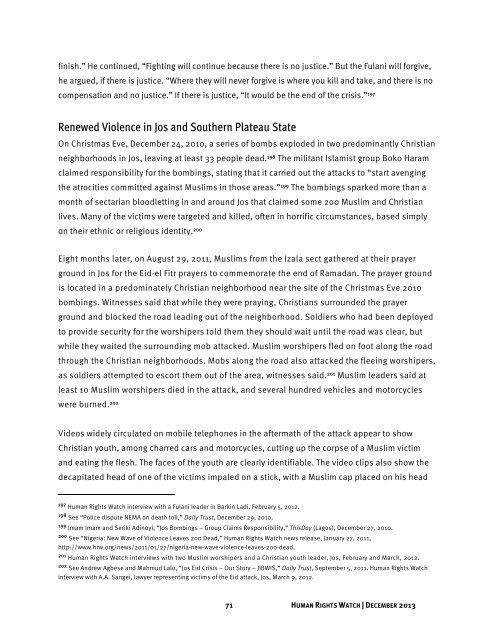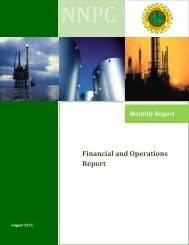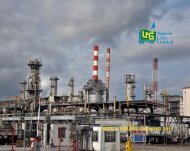Create successful ePaper yourself
Turn your PDF publications into a flip-book with our unique Google optimized e-Paper software.
finish.” He continued, “Fighting will continue because there is no justice.” But the Fulani will forgive,<br />
he argued, if there is justice. “Where they will never forgive is where you kill and take, and there is no<br />
compensation and no justice.” If there is justice, “It would be the end of the crisis.” 197<br />
Renewed Violence in Jos and Southern Plateau State<br />
On Christmas Eve, December 24, 2010, a series of bombs exploded in two predominantly Christian<br />
neighborhoods in Jos, leaving at least 33 people dead. 198 The militant Islamist group Boko Haram<br />
claimed responsibility for the bombings, stating that it carried out the attacks to “start avenging<br />
the atrocities committed against Muslims in those areas.” 199 The bombings sparked more than a<br />
month of sectarian bloodletting in and around Jos that claimed some 200 Muslim and Christian<br />
lives. Many of the victims were targeted and killed, often in horrific circumstances, based simply<br />
on their ethnic or religious identity. 200<br />
Eight months later, on August 29, 2011, Muslims from the Izala sect gathered at their prayer<br />
ground in Jos for the Eid-el Fitr prayers to commemorate the end of Ramadan. The prayer ground<br />
is located in a predominately Christian neighborhood near the site of the Christmas Eve 2010<br />
bombings. Witnesses said that while they were praying, Christians surrounded the prayer<br />
ground and blocked the road leading out of the neighborhood. Soldiers who had been deployed<br />
to provide security for the worshipers told them they should wait until the road was clear, but<br />
while they waited the surrounding mob attacked. Muslim worshipers fled on foot along the road<br />
through the Christian neighborhoods. Mobs along the road also attacked the fleeing worshipers,<br />
as soldiers attempted to escort them out of the area, witnesses said. 201 Muslim leaders said at<br />
least 10 Muslim worshipers died in the attack, and several hundred vehicles and motorcycles<br />
were burned. 202<br />
Videos widely circulated on mobile telephones in the aftermath of the attack appear to show<br />
Christian youth, among charred cars and motorcycles, cutting up the corpse of a Muslim victim<br />
and eating the flesh. The faces of the youth are clearly identifiable. The video clips also show the<br />
decapitated head of one of the victims impaled on a stick, with a Muslim cap placed on his head<br />
197 Human Rights Watch interview with a Fulani leader in Barkin Ladi, February 5, 2012.<br />
198 See “Police dispute NEMA on death toll,” Daily Trust, December 29, 2010.<br />
199 Imam Imam and Seriki Adinoyi, “Jos Bombings – Group Claims Responsibility,” ThisDay (Lagos), December 27, 2010.<br />
200 See “Nigeria: New Wave of Violence Leaves 200 Dead,” Human Rights Watch news release, January 27, 2011,<br />
http://www.hrw.org/news/2011/01/27/nigeria-new-wave-violence-leaves-200-dead.<br />
201 Human Rights Watch interviews with two Muslim worshipers and a Christian youth leader, Jos, February and March, 2012.<br />
202 See Andrew Agbese and Mahmud Lalo, “Jos Eid Crisis – Our Story – JIBWIS,” Daily Trust, September 5, 2011. Human Rights Watch<br />
interview with A.A. Sangei, lawyer representing victims of the Eid attack, Jos, March 9, 2012.<br />
71 HUMAN RIGHTS WATCH | DECEMBER 2013




